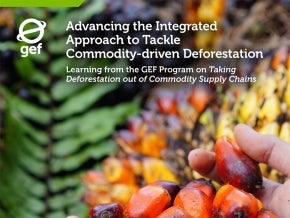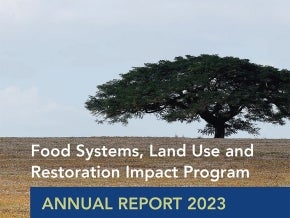
By Paul Polman, CEO, Unilever
Let’s start with the good news. Humankind is living longer than ever before. Fewer of us are going to bed hungry. Improvements in diets and modern medicine have contributed to a 20-year increase in the average global life expectancy since 1960. The number of undernourished people has fallen from 1 billion in 1991 to 815 million today, even as world population has grown by over 2 billion.
To allow this tremendous progress, the world has applied ingenuity to adapt and scale our agricultural systems to meet the demands of a growing population— but this has come at a heavy price for our people and planet. In fact, our food and land use systems are no longer fit for purpose.
They drive massive environmental destruction, accounting for around 25% of greenhouse gas emissions and cause devastating losses of natural capital – including shrinking biodiversity, soil erosion and reduced fertility. Over half of the land used for agriculture worldwide is moderately or severely degraded and one third of the world’s food – costing $940bn per year – is currently lost or wasted. At the same time, rates of obesity and diet-related non-communicable diseases like type 2 diabetes are growing, while food insecurity and malnutrition continue to persist for too many and 500 million smallholder farmers live below the poverty line.
This is simply not sustainable.
As the producers, manufacturers and retailers of most of the world’s food, businesses have a responsibility to help drive food and land use system transformation. This is not just because it is the right thing to do, but also because it is good business. A report by the Business and Sustainable Development Commission found that transforming our food and land use systems could generate $2.3tn a year, and create 80m jobs by 2030.
Many companies are already taking action — bringing digital innovation, research and development skills to bear on food and agricultural issues — and, in turn, future-proofing their own supply chains and opening up new market opportunities.
But no company can do this alone. There is an urgent need for a new, independent coalition of public and private stakeholders that can combine leadership and vision with the technical depth necessary to solve these complex challenges. That is why I am proud to chair the Food and Land-Use Coalition which brings together an alliance of progressive businesses, forward-thinking policymakers, foundations, investors, academics, international organisations and members of civil society.
The coalition will develop credible science-based targets and pathways to tackle key environmental and social challenges. These will guide investment in specific business solutions, such as reducing food waste, identifying alternative animal proteins and promoting greater crop diversification. And it will support individual countries. In Colombia, for example, it is presenting a set of integrated policy and investment recommendations – with input from over 130 stakeholders across business, government and civil society organisations – to the incoming government. These are designed to drive action in crucial areas, such as deforestation and farmer livelihoods.
Momentum for transformation is already building. In April this year, 30 countries collectively pledged $4.1bn (£3bn) to the seventh replenishment of the Global Environment Facility (GEF) trust fund. For the first time, this replenishment contains a specific allocation of funds for projects that improve food systems and reduce their environmental impact. This builds on the GEF’s continued commitment, for over a quarter of a century, to protecting the global commons. It’s a sign of a growing recognition that our food and land use systems should go hand in hand with sustainable, environmentally sound development.
But there is no time to waste. Vast amounts of human ingenuity and investment have gone into making food and land systems capable of meeting the demands of a growing population. We now need to turn our efforts towards repairing today’s broken food system and make it work for the long-term benefit of people and planet. With the support of such initiatives as the GEF and the Food and Land Use Coalition, we have a unique opportunity to begin doing just that.


